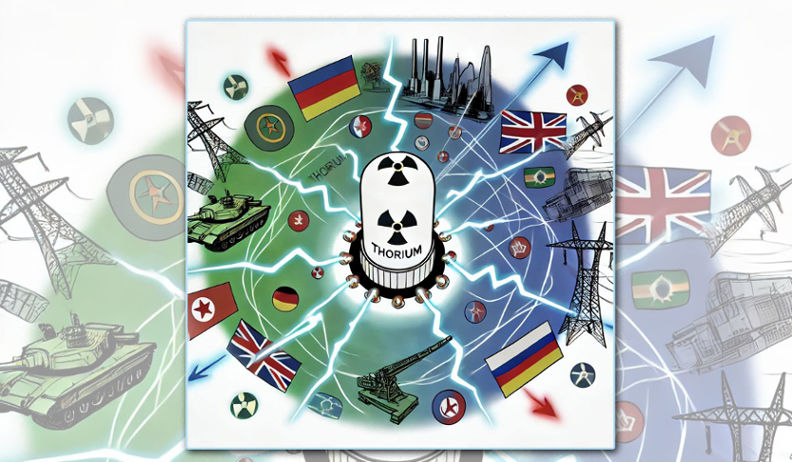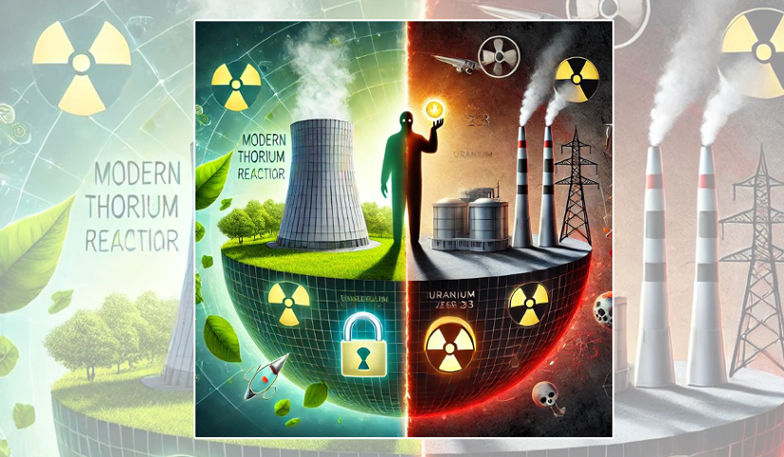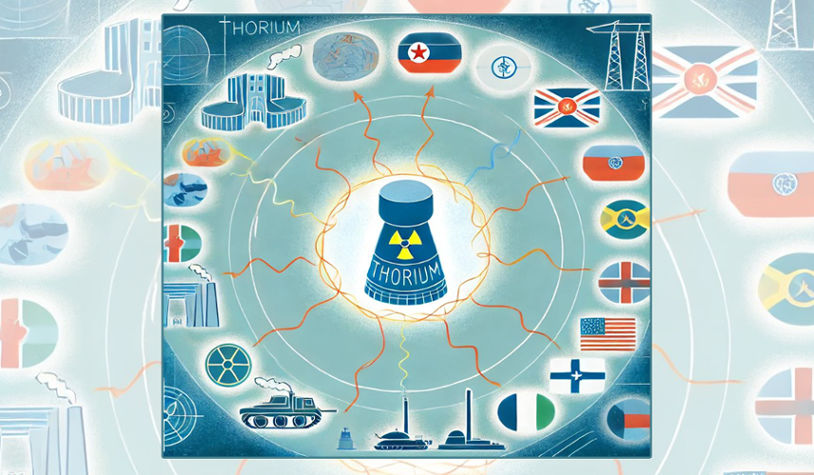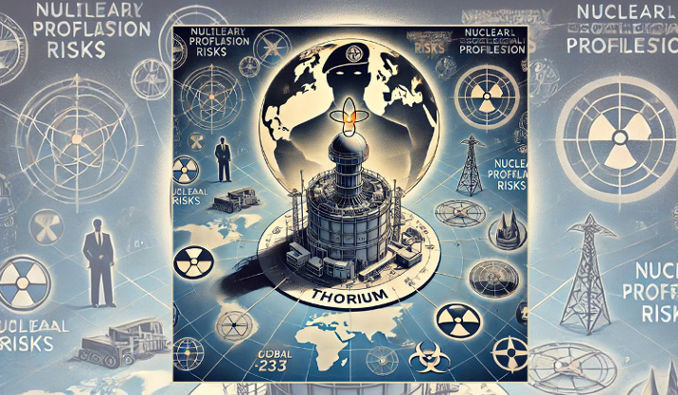What is Thorium?
Thorium is a naturally occurring element that has been considered as an alternative nuclear fuel for decades. Unlike uranium, which is commonly used in today’s nuclear reactors, thorium is more abundant and offers several potential advantages in terms of safety and efficiency.
Key Characteristics of Thorium
- Abundance: Thorium is more common in the Earth’s crust compared to uranium, making it a potentially more sustainable resource.
- Safety: Thorium reactors are designed to be inherently safer than conventional reactors. They operate at lower pressures and temperatures, reducing the risk of catastrophic failures.
- Waste Management: Thorium fuel cycles produce less long-lived radioactive waste compared to uranium.

The Promise of Thorium-Based Energy
Thorium’s potential benefits have spurred interest in developing thorium-based nuclear reactors. These reactors could address several critical issues facing the energy sector today.
Enhanced Safety Features
One of the most compelling arguments for thorium reactors is their enhanced safety. Unlike uranium reactors, which require constant cooling to prevent meltdowns, thorium reactors can be designed to shut down safely in the event of an emergency. This characteristic reduces the risk of nuclear accidents and enhances overall reactor safety.
Efficiency and Sustainability
Thorium reactors have the potential to be more efficient than traditional reactors. They can use a variety of thorium compounds and operate at higher thermal efficiencies. Additionally, thorium’s higher energy density means that less fuel is required to generate the same amount of energy, contributing to a more sustainable energy system.
Reduced Nuclear Waste
Thorium reactors produce less long-lived radioactive waste compared to uranium reactors. This reduction in waste is crucial for managing nuclear byproducts and minimizing the environmental impact of nuclear energy.

Geopolitical Risks Associated with Thorium
While thorium presents several advantages, its adoption also introduces a range of geopolitical risks. Understanding these risks is essential for evaluating thorium’s role in the global energy landscape.
Supply Chain Dependencies
Thorium is more abundant than uranium, but its extraction and processing are still relatively complex. Countries that dominate thorium supply chains could wield significant geopolitical influence. Nations that lack access to thorium resources may face energy security challenges, potentially leading to geopolitical tensions.
Proliferation Risks
Thorium reactors are generally considered to be less prone to nuclear weapons proliferation than uranium reactors. However, the technology used in thorium reactors can still be misused. The potential for weaponization of thorium-based technology remains a concern, especially if it falls into the wrong hands.
Technological and Infrastructure Barriers
The transition to thorium-based energy requires significant investment in research and development, as well as infrastructure upgrades. Countries with advanced nuclear programs are better positioned to make this transition, potentially widening the gap between developed and developing nations. This disparity could exacerbate existing geopolitical inequalities and create new power dynamics in the global energy arena.

Opportunities for International Cooperation
Despite the risks, thorium also offers opportunities for international cooperation. Collaborative efforts in research and development can help address some of the technical and safety challenges associated with thorium reactors.
Joint Research Initiatives
International partnerships can accelerate the development of thorium-based technologies. Collaborative research initiatives can pool resources, share knowledge, and address common challenges more effectively. Such cooperation can also help standardize safety protocols and regulatory frameworks, facilitating a smoother transition to thorium-based energy.
Shared Infrastructure Investments
Building and upgrading infrastructure for thorium reactors can be expensive. International cooperation on infrastructure projects can reduce costs and ensure that resources are allocated efficiently. Joint ventures and shared investments can also help bridge the gap between countries with varying levels of technological expertise.
Global Regulatory Standards
Developing global regulatory standards for thorium reactors is crucial for ensuring safety and preventing misuse. International organizations can play a key role in establishing and enforcing these standards, promoting transparency and accountability in the development and deployment of thorium-based technologies.
Case Studies: Thorium Research Around the World
Several countries are actively researching and testing thorium-based reactors. These case studies provide insights into the progress being made and the challenges being faced in the development of thorium energy.
India: Leading the Charge
India has been at the forefront of thorium research and development. The country’s ambitious nuclear energy program includes a focus on thorium reactors as a means of addressing its energy needs and reducing reliance on imported uranium. India’s progress in this area highlights the potential for thorium to play a significant role in national energy strategies.
China: A Growing Interest
China has also shown considerable interest in thorium technology. The country’s investment in thorium research reflects its broader strategy to diversify energy sources and enhance energy security. China’s advancements in thorium reactor technology could have implications for global energy markets and geopolitical dynamics.
The United States: Research and Development Efforts
In the United States, thorium research has faced both support and skepticism. While there is ongoing research into thorium reactors, the technology has not yet been widely adopted. The U.S. experience underscores the challenges of transitioning to new energy technologies and the need for continued investment in research and development.
The Future of Thorium in the Global Energy Landscape
The future of thorium in the global energy landscape will depend on several factors, including technological advancements, geopolitical developments, and international cooperation. Thorium has the potential to reshape the energy sector, offering both significant benefits and complex challenges.
Technological Advancements
Ongoing research and development will be critical in overcoming the technical challenges associated with thorium reactors. Advances in reactor design, fuel processing, and waste management will determine the feasibility and scalability of thorium-based energy solutions.
Geopolitical Developments
Geopolitical dynamics will play a crucial role in shaping the future of thorium energy. Countries that invest in thorium technology may gain strategic advantages, while those that lag behind could face energy security challenges. Managing these geopolitical risks will be essential for ensuring that thorium’s potential benefits are realized without exacerbating global tensions.
International Collaboration
Successful deployment of thorium technology will require international collaboration. Shared research efforts, infrastructure investments, and regulatory frameworks can help address the challenges associated with thorium energy and ensure that its benefits are distributed equitably.
Thorium represents a promising frontier in the quest for sustainable and secure energy solutions. Its potential benefits, including enhanced safety, efficiency, and reduced waste, make it an attractive alternative to traditional nuclear fuels. However, the geopolitical risks associated with thorium—such as supply chain dependencies, proliferation concerns, and infrastructure challenges—must be carefully managed.
By fostering international cooperation and addressing these risks, the global community can harness thorium’s potential to create a more sustainable and secure energy future. As research and development continue, thorium could play a pivotal role in shaping the energy landscape of tomorrow, offering both opportunities and challenges that will influence global energy policies and geopolitical dynamics for years to come.
